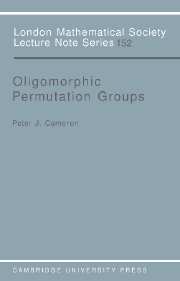3 - Examples and growth rates
Published online by Cambridge University Press: 23 November 2009
Summary
MONOTONICITY
In this chapter, I consider the problem of determining which sequences of natural numbers can occur as (fn) or (Fn) for some oligomorphic permutation group. The problem in this generality is quite out of reach. All I can do is to illustrate by examples some of the possibilities that can occur, and to describe some of the restrictions on realisable sequences which have been established.
We saw in the last chapter that any permutation group is a dense subgroup of the automorphism group of a homogeneous relational structure, so it suffices to consider these groups. Moreover, since the group is oligomorphic, the structure is ℵ0-categorical. The results of §2.5 imply that the sequences (fn) and (Fn) realised by oligomorphic groups are precisely those which enumerate unlabelled and labelled structures respectively in a class of finite structures satisfying Fraïssé's hypotheses (notably, the amalgamation property). From this point of view, two subcases commend themselves to us:
(a) classes having the strong amalgamation property;
(b) ages of homogeneous structures over finite relational languages.
Other subcases are obtained by imposing model-theoretic conditions in the neighbourhood of stability on the homogeneous structure.
The most important basic restriction on realisable sequences is that they must be monotonic.
- Type
- Chapter
- Information
- Oligomorphic Permutation Groups , pp. 49 - 80Publisher: Cambridge University PressPrint publication year: 1990



